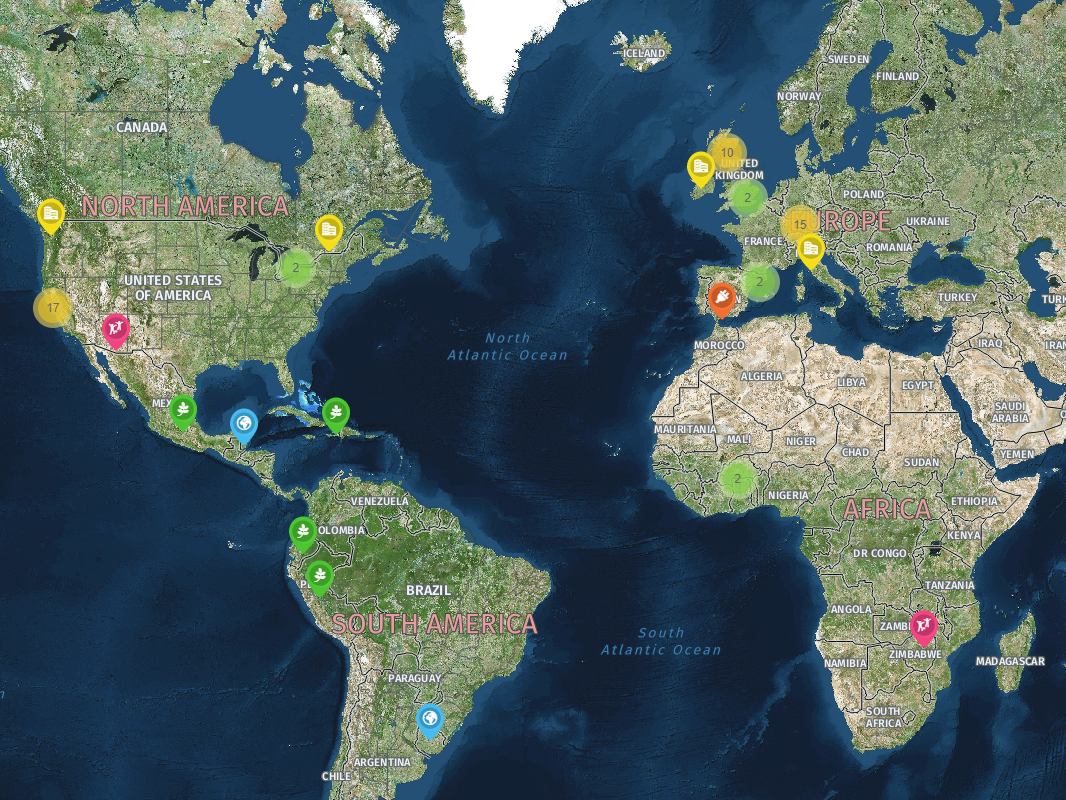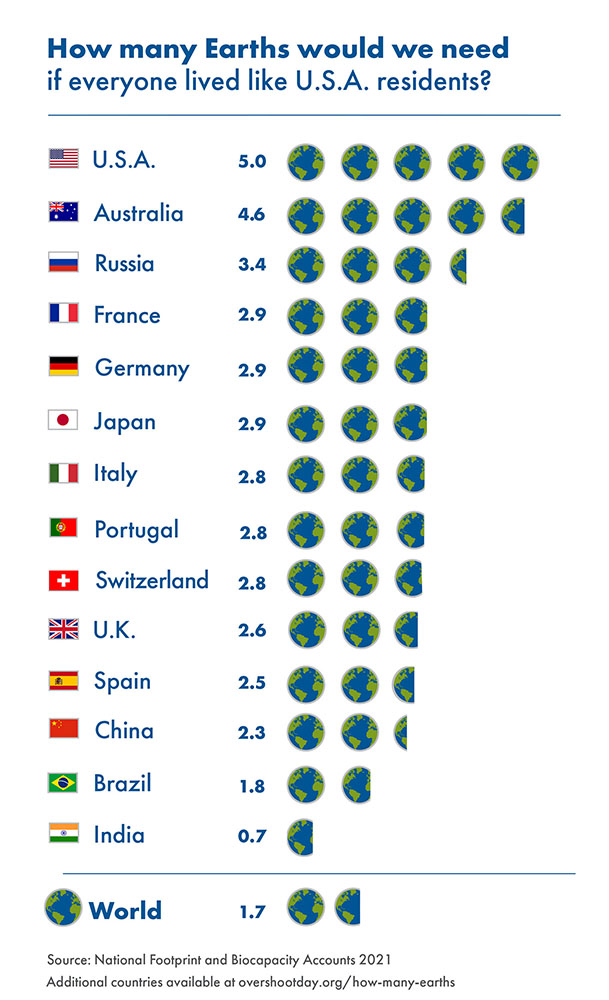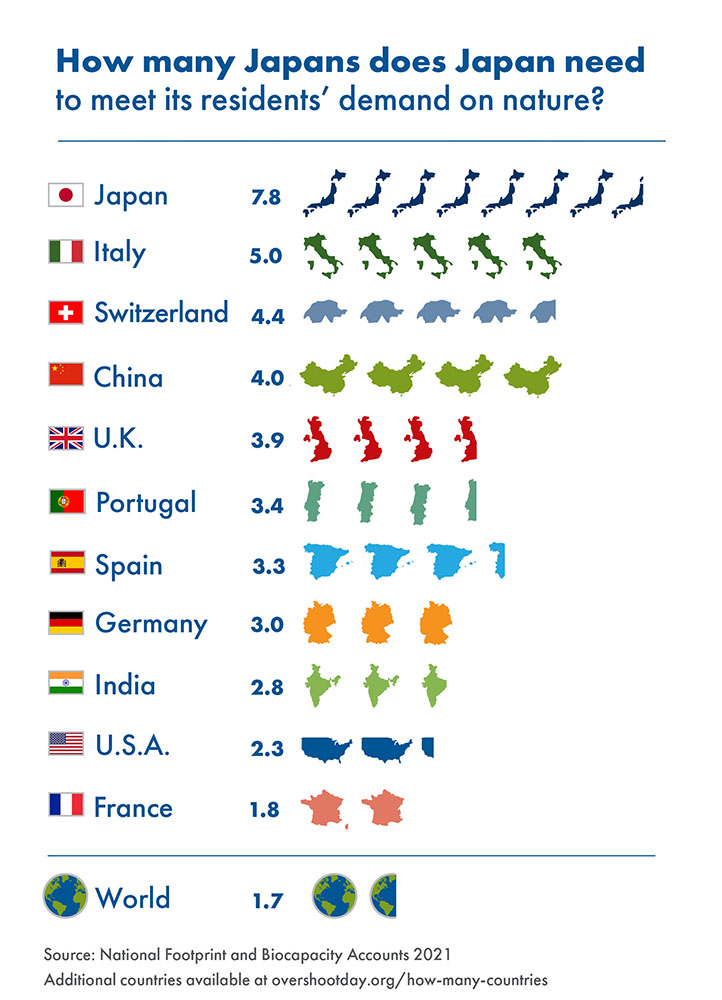


May 5 is German Overshoot Day:
Cities and citizens’ initiatives show local answers for the good life
(Wuppertal / Aachen, Germany) – May 5 is Germany’s Overshoot Day: if everybody around the world lived like Germany’s residents, today would be Earth Overshoot Day, according to the National Footprint and Biocapacity Accounts published by the Footprint Data Foundation, York University, and Global Footprint Network.
From January 1st until today, German residents have per person used as much from nature as the planet is able to renew per person in the entire year. Pushing back the date (#MoveTheDate) of Germany’s and Earth Overshoot Days is possible if we re-design our infrastructures, make our processes far more resource efficient, decarbonize our energy systems, capture CO2 through reforestation and other means, and live in ways that requires fewer resources.
Even though we may not have noticed them, especially since many of us have been confined at or near our home, many citizens-driven initiatives, municipal policies, and business strategies already strive to do this. As citizens, our own way of life determines climate developments every day. In this context, civil society initiatives are already shaping sustainable futures in an organized way, be it politically or practically. They implement social innovations at the local level and thus demonstrate that the good life is feasible, fun, and enjoyable.
We #MoveTheDate, a project led by Global Footprint Network and the Collaborating Centre on Sustainable Consumption and Production (CSCP), with the support of the Mercator Foundation, is set to engage with citizen initiatives, city administrations and the general public in Germany to promote preferred solutions to #MoveTheDate, as well as pathways to multiply them. The pilot project, together with the cities of Aachen and Wuppertal, aims to demonstrate the impact of municipal and civil society actors’ activities. The cities still have a long way to go before reaching their goals, but they have set out on the road together with strong partners – their local citizens.
“Climate protection is the answer to a social problem that directly affects us all. Especially at the local level, there is great potential to help shape a climate-friendly and resource-conserving future through direct dialogue with city governments. We #MoveTheDate supports such civil society engagement and therefore we are very pleased to support this project,” said Dr. Lars Grotewold, Head of Climate Protection at Stiftung Mercator.
“Climate change and exploding resource demand around the world are converging into the perfect storm of resource insecurity. ‘Fixing our boat’ and investing in our community is the most obvious way to improve our own chances for a secure future,” agreed Uwe Schneidewind, Lord Mayor of the City of Wuppertal. “That way, this ‘storm’ will also subside and we can deal with its aftermath.”
Already, many initiatives designed to shape a sustainable future are showing the way. They can be models of what we need to embrace, expand, and replicate to recover post-COVID.
For example, amidst its hilly territory, Wuppertal boasts one of the highest trafficked urban bike paths network in Germany. The 23-kilometers long Nordbahntrasse has quickly become a fast commute option favored by working people and schoolchildren alike. Some 90 million cyclists and pedestrians are expected to travel on the route over the next 30 years. The transformation of the former railroad line was initiated by the citizens’ initiative Wuppertalbewegung e.V. It is an outstanding example of the active and diverse civil society that shapes the city’s sustainable development.
At the political level, the city of Aachen, meanwhile, laid the strategic foundation for a climate-neutral city by 2030 or before with the Integrated Climate Protection Concept (IKSK). The 5-year, 30-million-euro program already lists more than 70 concrete projects and plans for continuous review and improvement.
“Embarking on this path is a complex undertaking, but indispensable for a good life now and in the future in our city. Such approaches postpone the German Overshoot Day,” said Sybille Keupen, Lord Mayor of the City of Aachen.
A major lever for the city of Aachen lies in its solar energy potential. The surface area of its roofs eligible to support photovoltaic systems is large enough to meet the electricity demand of the inhabitants. Launched last September under the IKSK umbrella, the Öcher Solar Support Program aims to lower CO2 emissions by 77,000 tons each year, thanks to subsidies and consulting services provided by the city. The financing of 150 rooftop solar installations has been secured, with another 1000 to be initiated this year.
These projects and strategies only exemplify how much innovation and willpower is already being unleashed. We #MoveTheDate calls on everyone to show what is already being done in Germany to move the date. From eliminating food waste to repair cafes, from regulatory mandates to neighborhood initiatives, all projects can be posted on the #MoveTheDate Solutions Map. The best entries added before World Environment Day (June 5) will be promoted through all our communication channels (submissions will be judged on the quality of the entry and the impact of the solution).
Examples and contest details are available at www.overshootday.org/germany-solutions
Ultimately, it will come down to a simple question: Can we act fast enough to effectively design a future where we can thrive in balance with the regenerative budget of nature? Or will that rebalancing be imposed by disaster?
#########
There are many ways to #MoveTheDate. Here are some cool options from Germany. And there are many more around the world. Which ones move and inspire you?

Additional Resources
- Featured solutions from Germany: overshootday.org/germany-solutions
- Post your preferred solutions on movethedate.overshootday.org
Media Contacts
Alexandra Kessler
alexandra.kessler@scp-centre.org
+49 (0) 202 459 58 – 10
Laetitia Mailhes
laetitia.mailhes@footprintnetwork.org
+33 650 979 012
About Ecological Overshoot
Since the early 1970s, humanity has been in an ecological deficit. While Germany’s biocapacity per person is about the same as the world’s, its Ecological Footprint per inhabitant is about three times as large. The overload cannot continue forever. The effects of this global ecological overshoot can already be observed in the form of deforestation, soil erosion, loss of biodiversity and the accumulation of carbon dioxide in the atmosphere. Running an ecological deficit means that we are not only consuming the annual “interest” on our natural capital, but also depleting it by taking resources from the future to pay for the present. Operating on the ecological advances of future generations is obviously not a successful long-term strategy.
About this project
Visit the project description here.
About CSCP
The Collaborating Centre on Sustainable Consumption and Production (CSCP) is an international, non-profit think and do Tank based in Wuppertal, Germany, working with policymakers, businesses, partner organizations and civil society to create a good life for everyone on our planet. With over 40 ongoing projects both locally and internationally, we are shaping the transformation to future-proof lifestyles, new business models and sustainable products and services.
About Global Footprint Network
Global Footprint Network is an international sustainability organisation that is helping the world live within the Earth’s means and respond to climate change. Since 2003 we’ve engaged with more than 50 countries, 30 cities, and 70 global partners to deliver scientific insights that have driven high-impact policy and investment decisions. Together, we’re creating a future where all of us can thrive within the limits of our one planet. www.footprintnetwork.org
On the ecological footprint:
- Basic concepts: https://www.overshootday.org/newsroom/media-backgrounder/
- How is country overshoot day calculated (using Switzerland as an example): https://www.overshootday.org/newsroom/country-overshoot-days/
- What are the Ecological Footprint results for countries? data.footprintnetwork.org
- What are the latest results for Germany?
- What is an Ecological Footprint? https://www.overshootday.org/kids-and-teachers-corner/what-is-an-ecological-footprint/
- How the Ecological Footprint works: http://www.achtung-schweiz.org/en/q-a/
- Ecological Footprint and Biocapacity Accounting – What It Does: https://oneplanetalliance.org/ecological-footprint/
- Relationship to climate protection: https://www.footprintnetwork.org/our-work/climate-change/
- Climate and Footprint: https://www.footprintnetwork.org/2017/11/09/ecological-footprint-climate-change/


